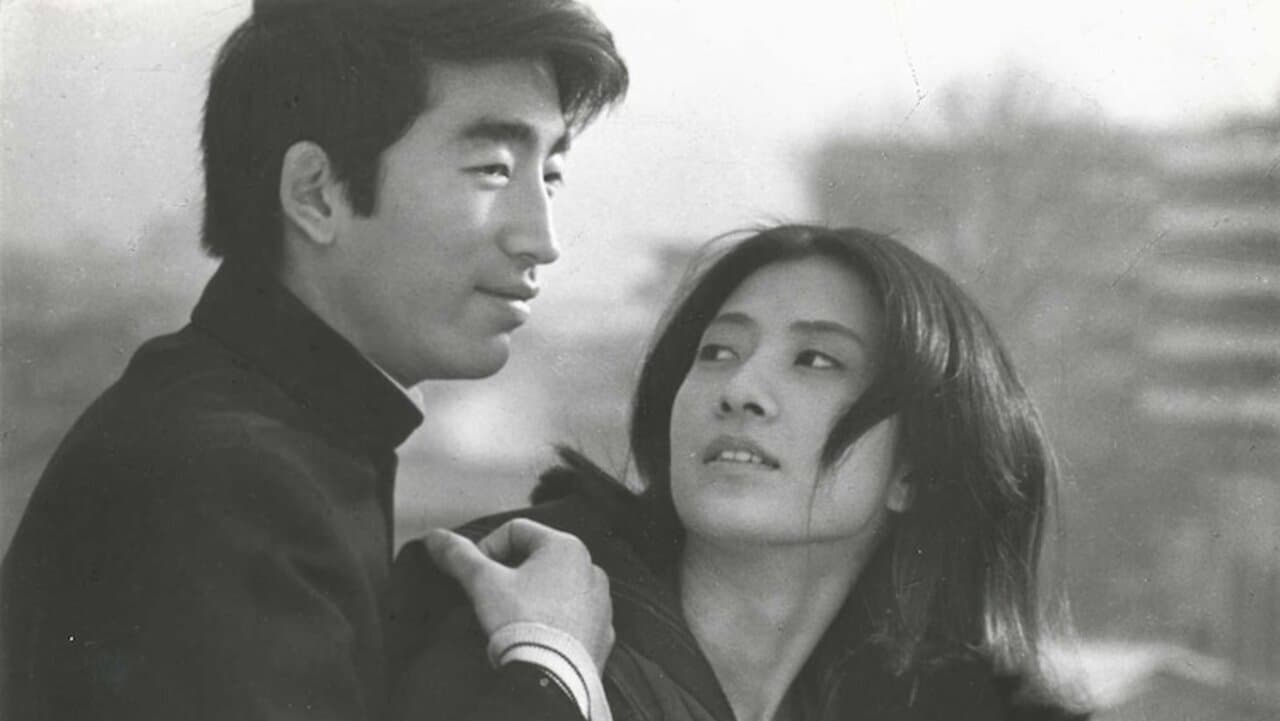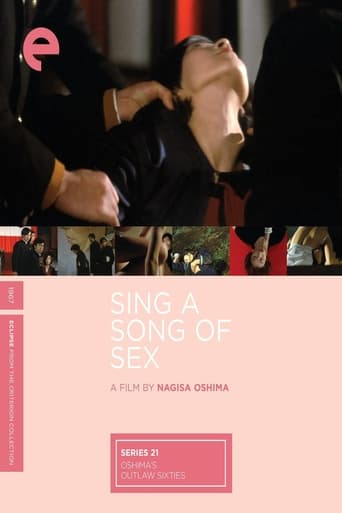UnowPriceless
hyped garbage
Phonearl
Good start, but then it gets ruined
Fairaher
The film makes a home in your brain and the only cure is to see it again.
Bessie Smyth
Great story, amazing characters, superb action, enthralling cinematography. Yes, this is something I am glad I spent money on.
mevmijaumau
It's interesting to me how basically each Nagisa Oshima film is so stylistically different even though most if not all deal with the topics of sex, violence and politics. Sing a Song of Sex (aka A Treatise on Japanese Bawdy Songs), based on an essay by Tomomichi Soeda, is a strange hybrid of a transgressive teenage angst film, a political manifesto, an off-beat musical, an indictment of society and a hallucinative art film.The movie follows four students whose teacher (played by Tampopo director Juzo Itami) delivers long drunken speeches about bawdy folk songs and how they were invented as a sexual outlet by and for the oppressed people. The students take in a different message and go on with their weird rape fantasies, mostly hanging around and singing bawdy songs. The film is a bizarre portrayal of the aimless youth of the time, but it also criticizes the Japanese intolerance towards Korean minorities (a theme later explored in two other Oshima films). Beyond that though, the movie is a bit too strange to make a head or tail out of it. It oscillates between light confusion and uncomfortable strangeness, always faithful to the red-black color palette (which I really dig) and its soundtrack composed of bawdy folk songs and American evergreens. A recommendation, maybe.
MisterWhiplash
Sing a Song of Sex, or 'A Treatise on Japanese Bawdy Songs' (frankly I can't really tell you which title is better) is done by a filmmaker who has a kind of poker face, and only reveals his hand just slightly half-way through, so that by the end you really feel the collective punch of his full show of cards. It's a story that has a melancholy air to it, but suffused with a captivating sense of irony and self-consciousness ultimately with itself. Its main characters really couldn't give a damn, except to get laid, and in a way it's like the twisted older cousin of an American Pie movie... only without the bawdy jokes and replaced with bawdy songs, I guess.This film takes a look at aimless youths finishing high school and getting ready for college who after the sudden death of a teacher wander about singing the same song of sex (going through ten scenarios through the song), and imagining raping a girl in a classroom. There is also a girlfriend of sorts (or two) who follow with their pack, and at one point they come across a group singing protest songs in English. But mostly not a whole lot "happens" except that Oshima gets precisely and dangerously into the minds of his politically conscious - or un-conscious- minds. What do these four boys think about? What's their plan or play? What about the one student who may or may not (or not likely) have been able to save the teacher's life? The style starts out very realistically, which opens it up for how bizarre it gets later on since nothing seems too self-conscious, but everything has on another air of fantasy to it. The last ten minutes gets especially brutal, though all with a slow and uncomfortably surreal boil (by uncomfortable I mean as a compliment). It's a mature, super-black comic work by a director who knows how to put the camera in positions that make his characters more than just figures in a frame but figures set against the backdrops they're in (snow, city buildings, bridges, crowds, the empty school room).
crossbow0106
This movie is about four male high school students who took their university entrance exams and are just hanging around mostly. They have a connection with their teacher Mr. Otake and they go out drinking with him and 3 female classmates. Mr. Otake starts singing a bawdy Japanese folk song, a song sung throughout the film by the male characters. One night after heavy drinking, Otake pays for the girls and guys to stay at an inn since the trains have stopped running. Otake puts on the gas stove, falls drunkenly asleep and accidentally kills himself by poisoning. The girls are inconsolable, the guys nonchalant. The guys become obsessed with a fellow classmate, mostly known by her seat number 469. The film goes from there, with meeting her, meeting Otake's mistress and singing the song. This take on disenfranchised youth in Tokyo is very effective. Director Oshima Nagisa is well known for pushing the envelope (he directed the notorious "In The Realm Of The Senses")and this character study is interesting, with good young actors in the pivotal roles. The movie title notwithstanding, this is not a pornographic film, it has very little nudity and very little violence. Its just a story of attitude, indifference and, if not fear, wariness of what lies ahead. I liked the pacing in this film and generally feel you'll like it if you like Japanese drama. Not perfect, but an interesting film from a maverick director who has no problem making you think.
tedg
Four Japanese high junior school boys are obsessed with sex. They encounter their teacher out drinking and he sings/teaches a bawdy song about whose permission you need to ask before sleeping with a girl. "Sleeping with" means essentially raping. The drunk teacher accidentally dies, kicking off a more abstract round of imaginary acts of the quartet, beginning with the rape of their female teacher in class while other students placidly watch. They incessantly chat about and imagine what they would do with their classmates.The leader of the gang ties up with the teacher's girlfriend and that's when some of the most impressive imagery appears, during a party-funeral peppered with bawdy songs. The casket is draped in an American flag. The funeral devolves into a battle between those songs and religious ones, mirroring a battle between Japan and the US (or alternatively Korea). I'm uncharacteristically explaining this because you probably will not ever the film.The last ten minutes is a lecture in the class by the girlfriend about the honor of the Japanese people while the students hesitantly attempt the much discussed rape of the girl in seat 468. The lead student kills the girl to prevent the rape.I came to this because I valued my experience with "All About Lily Chou Chou," and wanted to experience much the same thing in a more vintage original. It lacks the power I expected. Stick with "Lily Chou."It is much more complex but less effective than "Realm of the Senses" shot a decade later.Ted's Evaluation -- 2 of 3: Has some interesting elements.

